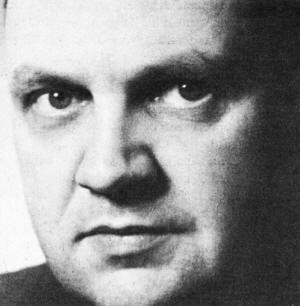
Longīns Apkalns
(19.12.1923 - 30.03.1999 )
Place of birth: Riga.
Places of residence and employment: 1944 – arrived in Germany as a refugee; from 1950 onward – a soloist with the Osnabrück Opera, the Detmold Opera and the German Radiophone. Died on March 30, 1999, in Hövelhof, Germany; reinterred on May 11, 1999, in the Cēsis Cemetery, Latvia. Other information: Considered one of the most radical Latvian composers in Europe, although his modern constructivist style has a romantic undertone. As a music critic, Apkalns wrote for both the Latvian and non-Latvian press as well as special editions. He was among the conductors of the large, combined choir at the 2 nd European Latvian Song Festival, the 2 nd Latvian Youth Song Festival in Rochester, NY (United States), and the World Federation of Free Latvians Song Days in Gotland.
Education: 1945–1947 – the last student of Prof. Jāzeps Vītols in Germany; from 1946 onward – studies in vocal music and composition at the Detmold Academy of Music.
Oeuvre: Symphonic music: Symphony No. 1 “Gauja” (The Gauja River); Symphony No. 2 “Novembra simfonija” (November Symphony) for mixed choir and symphony orchestra with lyrics by Edvarts Virza; Symphony No. 3 “Gaiziņš” (Gaiziņš Hill); Concerto for accordion, harp and string orchestra; Vizmas (Glimmers) for small symphony orchestra and electric organ. Vocal music: sixteen songs for mixed choir a cappella (of which six are arrangements of Latvian folk songs); four songs for men’s choir a cappella (of which three are arrangements of Latvian folk songs); four arrangements of folk songs for women’s choir a cappella; approximately twenty solo songs; Eight Latvian Folk Songs for Solo Voice and Small Orchestra; Ten Poems from Veronika Strēlerte’s Book “Mēness upe” (River of the Moon) – a song cycle for solo voice and piano; Eight Songs by Kārlis Skalbe – a song cycle for solo voice and piano; Fünf Gedichte von Else Lasker-Schüler für Alt und Klavier (Five Poems by Else Lasker-Schüler for Viola and Piano); Seven Latvian Folk Songs for Voice and Instruments; Six Latvian Folk Songs for Solo Voice and Small Orchestra; Seven Hunting Songs for Solo Voice (Tenor) and Ensemble; Uz vairoga (On the Shield) – a song cycle for solo voice and piano; Zemcieši Songs with Lyrics by Andrejs Eglītis – a song cycle for solo voice and piano in four notebooks. Instrumental music: six piano compositions for children; Rasmas – an invention for accordion; Quaternio Latviensis
for organ; Concerto for oboe and piano in two parts; Music for String Orchestra; Raženības daina (Song of Plenty) for violin and piano; Rondo strano for wind quintet; Sonatina for cello and piano; approximately twenty compositions for kokle. Vocal- instrumental music: Kingiras rekviēms (Kingira Requiem) for mixed choir, two soloists, organ and symphony orchestra; Latviešu Dievs (Latvian God) – a cantata for mixed choir, symphony orchestra, high voice and narrator; Latviešu sveiciens (Latvian Greeting) – a poem for mixed choir, organ and two solo sopranos.
